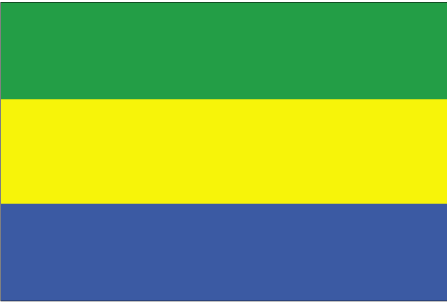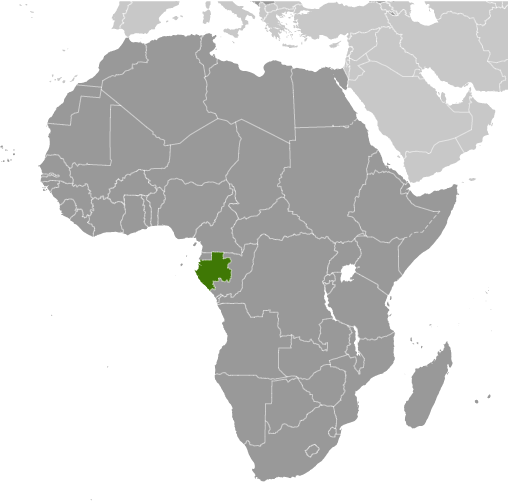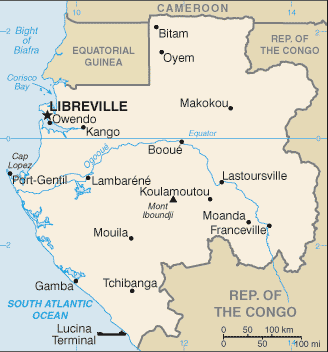Until recently, only two autocratic presidents had ruled Gabon since its independence from France in 1960. The recent president of Gabon, El Hadj Omar BONGO Ondimba - one of the longest-serving heads of state in the world - had dominated the country's political scene for four decades. President BONGO introduced a nominal multiparty system and a new constitution in the early 1990s. However, allegations of electoral fraud during local elections in 2002-03 and the presidential elections in 2005 exposed the weaknesses of formal political structures in Gabon. President BONGO died in June 2009. New elections in August 2009 brought Ali Ben BONGO, son of the former president, to power. Despite political conditions, a small population, abundant natural resources, and considerable foreign support have helped make Gabon one of the more prosperous and stable African countries. In January 2010, Gabon assumed a nonpermanent seat on the UN Security Council for the 2010-11 term.
Population
1,545,255
Country comparison to the world:151
note:estimates for this country explicitly take into account the effects of excess mortality due to AIDS; this can result in lower life expectancy, higher infant mortality, higher death rates, lower population growth rates, and changes in the distribution of population by age and sex than would otherwise be expected (July 2010 est.)
Nationality
Noun:Gabonese (singular and plural)
Adjective:Gabonese
Ethnic groups
Bantu tribes, including four major tribal groupings (Fang, Bapounou, Nzebi, Obamba); other Africans and Europeans, 154,000, including 10,700 French and 11,000 persons of dual nationality
Religions
Christian 55%-75%, animist, Muslim less than 1%
Languages
French (official), Fang, Myene, Nzebi, Bapounou/Eschira, Bandjabi
Country Name
Conventional long form:Gabonese Republic
Conventional short form:Gabon
Local long form:Republique Gabonaise
Local short form:Gabon
Government Type
republic; multiparty presidential regime
Capital
Name:Libreville
Geographic coordinates:0 23 N, 9 27 E
Time difference:UTC+1 (6 hours ahead of Washington, DC during Standard Time)
Administrative divisions
9 provinces; Estuaire, Haut-Ogooue, Moyen-Ogooue, Ngounie, Nyanga, Ogooue-Ivindo, Ogooue-Lolo, Ogooue-Maritime, Woleu-Ntem
Independence
17 August 1960 (from France)
National Holiday
Independence Day, 17 August (1960)
Constitution
adopted 14 March 1991
Legal system
based on French civil law system and customary law; judicial review of legislative acts in Constitutional Chamber of the Supreme Court; has not accepted compulsory ICJ jurisdiction
Suffrage
21 years of age; universal
Executive branch
Chief of state:President Ali Ben BONGO Ondimba (since 16 October 2009)
Head of government:Prime Minister Paul BIYOGHE MBA (since 15 July 2009)
Cabinet:Council of Ministers appointed by the prime minister in consultation with the president
(For more information visit the World Leaders website)
Elections: president elected by popular vote for a seven-year term (no term limits); election last held on 30 August 2009 (next to be held in 2016); prime minister appointed by the president
Election results: President Ali Ben BONGO Ondimba elected; percent of vote - Ali Ben BONGO Ondimba 41.7%, Andre MBA OBAME 25.9%, Pierre MAMBOUNDOU 25.2%, Zacharie MYBOTO 3.9%, other 3.3%
note:President BONGO died on 8 June 2009 after serving as president for 32 years; in accordance with the constitution he was replaced on an interim basis by the president of the Senate, Rose Francine ROGOMBE on 10 June 2009; new elections where held on 30 August 2009 and the son of the former president, Ali Ben BONGO Ondimba, was elected president
Legislative branch
bicameral legislature consists of the Senate (102 seats; members elected by members of municipal councils and departmental assemblies to serve six-year terms) and the National Assembly or Assemblee Nationale (120 seats; members are elected by direct, popular vote to serve five-year terms)
Elections: Senate - last held on 18 January 2009 (next to be held in January 2015); National Assembly - last held on 17 and 24 December 2006 (next to be held in December 2011)
Election results:Senate - percent of vote by party - NA; seats by party - PDG 75, RPG 6, UGDD 3, CLR 2, PGCI 2, PSD 2, UPG 2, ADERE 1, independents 9; National Assembly - percent of vote by party - NA; seats by party - PDG 82, RPG 8, UPG 8, UGDD 4, ADERE 3, CLR 2, PGP-Ndaot 2, PSD 2, independents 4, others 5
Judicial branch
Supreme Court or Cour Supreme consisting of three chambers - Judicial, Administrative, and Accounts; Constitutional Court; Courts of Appeal; Court of State Security; County Courts
Political Parties and Leaders
Circle of Liberal Reformers or CLR [General Jean Boniface ASSELE]; Congress for Democracy and Justice or CDJ [Jules Aristide Bourdes OGOULIGUENDE]; Democratic and Republican Alliance or ADERE [Divungui-di-Ndinge DIDJOB]; Gabonese Democratic Party or PDG [Simplice Nguedet MANZELA] (former sole party); Gabonese Party for Progress or PGP [Benoit Mouity NZAMBA]; Gabonese Union for Democracy and Development or UGDD [Zacherie MYBOTO]; National Rally of Woodcutters or RNB; National Rally of Woodcutters-Rally for Gabon or RNB-RPG (Bucherons) [Fr. Paul M'BA-ABESSOLE]; Party of Development and Social Solidarity or PDS [Seraphin Ndoat REMBOGO]; People's Unity Party or PUP [Louis Gaston MAYILA]; Social Democratic Party or PSD [Pierre Claver MAGANGA-MOUSSAVOU]; Union for Democracy and Social Integration or UDIS; Union of Gabonese Patriots or UPG [Pierre MAMBOUNDOU]
Political pressure groups and leaders
NA
International organization participation
ACCT, ACP, AfDB, AU, BDEAC, CEMAC, FAO, FZ, G-24, G-77, IAEA, IBRD, ICAO, ICCt, ICRM, IDA, IDB, IFAD, IFC, IFRCS, ILO, IMF, IMO, IMSO, Interpol, IOC, IOM, IPU, ISO (correspondent), ITSO, ITU, ITUC, MIGA, MINURCAT, NAM, OIC, OIF, OPCW, UN, UN Security Council (temporary), UNCTAD, UNESCO, UNIDO, UNMIS, UNWTO, UPU, WCO, WFTU, WHO, WIPO, WMO, WTO
Diplomatic representation in the US
Chief of mission:Ambassador Carlos Victor BOUNGOU
Chancery:Suite 200, 2034 20th Street NW, Washington, DC 20009
Telephone:[1] (202) 797-1000
FAX:[1] (202) 332-0668
consulate(s): New York
Diplomatic representation from the US
Chief of mission: Ambassador Eunice S. REDDICK
Embassy:Boulevard du Bord de Mer, Libreville
Mailing address:Centre Ville, B. P. 4000, Libreville; pouch:2270 Libreville Place, Washington, DC 20521-2270
Telephone: [241] 76 20 03 through 76 20 04, after hours - 07380171
FAX:[241] 74 55 07
Flag description
three equal horizontal bands of green (top), yellow, and blue; green represents the country's forests and natural resources, gold represents the equator (which transects Gabon) as well as the sun, blue represents the sea










